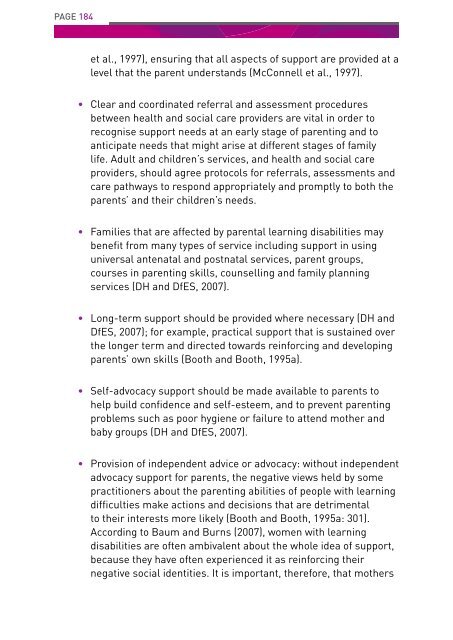Literature Review on Provision of Appropriate and Accessible ...
Literature Review on Provision of Appropriate and Accessible ...
Literature Review on Provision of Appropriate and Accessible ...
You also want an ePaper? Increase the reach of your titles
YUMPU automatically turns print PDFs into web optimized ePapers that Google loves.
PAGE 184<br />
et al., 1997), ensuring that all aspects <strong>of</strong> support are provided at a<br />
level that the parent underst<strong>and</strong>s (McC<strong>on</strong>nell et al., 1997).<br />
• Clear <str<strong>on</strong>g>Literature</str<strong>on</strong>g> <strong>and</strong> coordinated <str<strong>on</strong>g>Review</str<strong>on</strong>g> <strong>on</strong> referral Provisi<strong>on</strong> <strong>and</strong> <strong>of</strong> <strong>Appropriate</strong> assessment <strong>and</strong> procedures <strong>Accessible</strong><br />
Support to People with an Intellectual Disability who are<br />
between health <strong>and</strong> social care providers are vital in order to<br />
Experiencing Crisis Pregnancy<br />
recognise support needs at an early stage <strong>of</strong> parenting <strong>and</strong> to<br />
anticipate needs that might arise at different stages <strong>of</strong> family<br />
life. Adult <strong>and</strong> children’s services, <strong>and</strong> health <strong>and</strong> social care<br />
providers, should agree protocols for referrals, assessments <strong>and</strong><br />
care pathways to resp<strong>on</strong>d appropriately <strong>and</strong> promptly to both the<br />
parents’ <strong>and</strong> their children’s needs.<br />
• Families that are affected by parental learning disabilities may<br />
benefit from many types <strong>of</strong> service including support in using<br />
universal antenatal <strong>and</strong> postnatal services, parent groups,<br />
courses in parenting skills, counselling <strong>and</strong> family planning<br />
services (DH <strong>and</strong> DfES, 2007).<br />
• L<strong>on</strong>g-term support should be provided where necessary (DH <strong>and</strong><br />
DfES, 2007); for example, practical support that is sustained over<br />
the l<strong>on</strong>ger term <strong>and</strong> directed towards reinforcing <strong>and</strong> developing<br />
parents’ own skills (Booth <strong>and</strong> Booth, 1995a).<br />
• Self-advocacy support should be made available to parents to<br />
help build c<strong>on</strong>fidence <strong>and</strong> self-esteem, <strong>and</strong> to prevent parenting<br />
problems such as poor hygiene or failure to attend mother <strong>and</strong><br />
baby groups (DH <strong>and</strong> DfES, 2007).<br />
• Provisi<strong>on</strong> <strong>of</strong> independent advice or advocacy: without independent<br />
advocacy support for parents, the negative views held by some<br />
practiti<strong>on</strong>ers about the parenting abilities <strong>of</strong> people with learning<br />
difficulties make acti<strong>on</strong>s <strong>and</strong> decisi<strong>on</strong>s that are detrimental<br />
to their interests more likely (Booth <strong>and</strong> Booth, 1995a: 301).<br />
According to Baum <strong>and</strong> Burns (2007), women with learning<br />
disabilities are <strong>of</strong>ten ambivalent about the whole idea <strong>of</strong> support,<br />
because they have <strong>of</strong>ten experienced it as reinforcing their<br />
negative social identities. It is important, therefore, that mothers
















